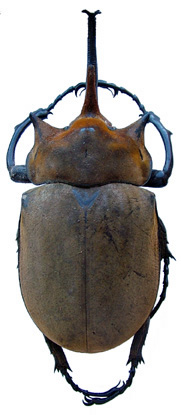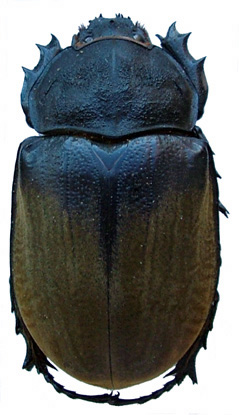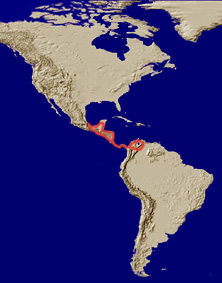|
| |
Classification
|
........Megasoma elephas (Fabricius,
1775)
........syn. Scarabaeus
elephas Fabricius, 1775
........syn. Megasoma mexicanum Fischer, 1968
........syn. Megasoma elephas iijimai Nagai, 2003 |
|
|
Megasoma
elephas (Fabricius,
1775)
male, dorsal view |
Megasoma
elephas (Fabricius,
1775)
female, dorsal view |
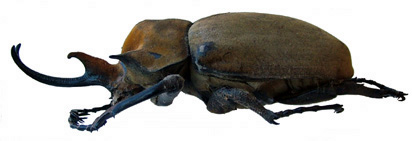
male, lateral
view
|
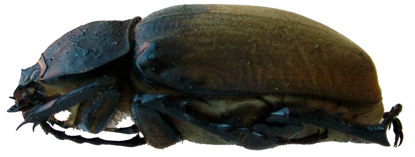
female,
lateral view
Photos
by Matthew R. Moore
|
| Distribution:
Southern
Mexico to Venezuela. |
|
|
| |
| |
| |
| |
| |
| |
| |
| |
| |
| |
| |
| |
| |
| |
| |
| |
| |
| |
| |
| |
| |
| |
| |
| |
| |
| |
| |
| |
| |
| |
| |
| |
| |
| |
| |
| |
| |
| |
| |
| |
| |
| |
| |
| |
| |
| |
| |
| |
| |
| |
| |
| |
| |
| |
| |
| |
| |
| |
Diagnosis:
Males with
elytra and pronoutm veluntinous; females with elytra velutinous. Males
with anterior tibiae arcuate. Anterior angles of pronotum produced into
antero-laterally projecting horns. Apices of anterior angles (horns)
of pronotum not curving inward. Females with pronotum rugose. Scutellum
at base rugose. Pronotum without longitudinal, posteromedian carina.
|
| |
| |
| |
| |
| |
| |
Biological
Data: Megasoma
elephas is found in tropical evergreen and deciduous forests at
elevations between 0-1000 m. Adult M. elephas are known to
feed on the sap of “machiche” (Lonchocarpus castilloi Standl.,
Fabaceae) (Ratcliffe 2005) and “tangerine” (Citrus
nobillis Lour., Rutaceae). During the night, adults cut a twig
using both foretibiae crossed as scissors and feed on the sap flows
(Ratcliffe 2005). Larvae of M. elephas have been collected
in the trunks of fallen and standing “jobo” (Spondias
mombin L., Anacardiaceae) and Cedrela mexicana Roem.
(Maliaceae) (Ratcliffe 2005). Males and females are attracted to lights
between 2100 and 2300 h, and most commonly fly when relative humidity
nears 98-100% and the temperature is 20.5-22°C (Morón 1979).
|
| |
| |
| |
| |
| |
| |
| |
| |
| |
| |
| |
Temporal
Distribution: September
to January (Morón 1979). |
| |
Larvae:
Ratcliffe and
Morón (2005) described the male and female pupae and the first,
second, and third instar larvae. |
| |
| |
References:
Morón,
M.A. 1979. Fauna de coleópteros lamelicornios de la Estación
de Biología Tropical, “Los Tuxtlas”, Veracruz, UNAM,
México. Anales del Instituto Biología de la Universidad
Nacional Autonoma de México 50(Series Zoología, 1): 375-454.
Ratcliffe,
B.C. and M.A. Morón. 2005. Larval descriptions of eight species
of Megasoma Kirby (Coleoptera: Scarabaeidae: Dynastinae) with
a key for identification and notes on biology. Coleopterists Bulletin
59: 91-126.
|
| |
| |
| |
| |
| |
| |
| |
| |
| |
|
|
|
|
Author: Matthew
R. Moore
Generated on: 22/JAN/2007 .....Last
modified: 22/JAN/2007
University of Nebraska State Museum - Division of Entomology
|
|

